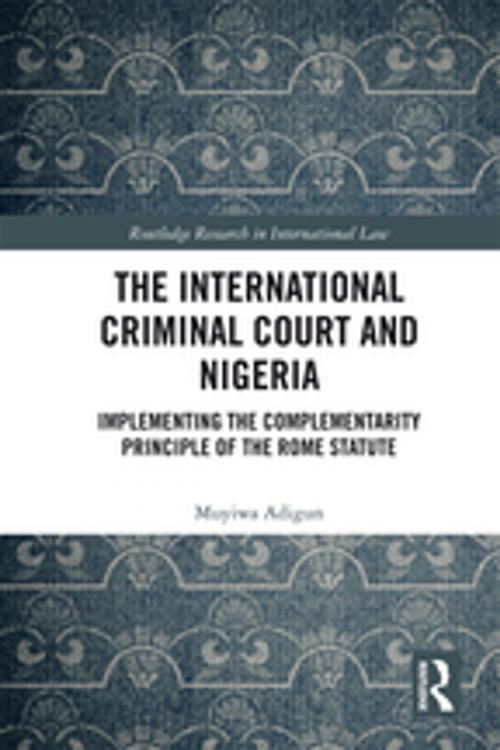The International Criminal Court and Nigeria
Implementing the Complementarity Principle of the Rome Statute
Nonfiction, Reference & Language, Law, Comparative, Courts, International| Author: | Muyiwa Adigun | ISBN: | 9781351580212 |
| Publisher: | Taylor and Francis | Publication: | December 14, 2017 |
| Imprint: | Routledge | Language: | English |
| Author: | Muyiwa Adigun |
| ISBN: | 9781351580212 |
| Publisher: | Taylor and Francis |
| Publication: | December 14, 2017 |
| Imprint: | Routledge |
| Language: | English |
If Nigeria fails to prosecute the crimes recognised under the Rome Statute, then the International Criminal Court (ICC) will intervene. The ICC is only expected to complement the criminal justice system in Nigeria and is not a court of first instance, but one of last resort. This is what is known as the principle of complementarity. Before the ICC can step in, it must make a finding of ‘unwillingness’ or ‘inability’ on the part of Nigeria. It is only after this finding is made that the ICC can take over the prosecution of the crimes recognised under the Statute from Nigeria. This book examines the criminal justice process in Nigeria and discovers that the justice system is latent with the requirements of ‘unwillingness’ and ‘inability.’ The requirements, which serve as tests for assessment, are as they are laid down by the Rome Statute and interpreted by the ICC. This book offers recommendations as to what Nigeria must do in order to avoid the ICC intervention by reversing those parameters that give rise to ‘unwillingness’ and ‘inability.’
The International Criminal Court and Nigeria: Implementing the Complementarity Principle of the Rome Statute offers a contribution to the advancement of international law and will be of practical use to African countries. It aims to sensitise policy makers in different African countries in respect of policy options open to them to close impunity gap in their respective countries. This volume addresses the topics with regard to international criminal law and comparative public law and will be of interest to researchers, academics, organizations, and students in the fields of international law, governance, and comparative criminal justice.
If Nigeria fails to prosecute the crimes recognised under the Rome Statute, then the International Criminal Court (ICC) will intervene. The ICC is only expected to complement the criminal justice system in Nigeria and is not a court of first instance, but one of last resort. This is what is known as the principle of complementarity. Before the ICC can step in, it must make a finding of ‘unwillingness’ or ‘inability’ on the part of Nigeria. It is only after this finding is made that the ICC can take over the prosecution of the crimes recognised under the Statute from Nigeria. This book examines the criminal justice process in Nigeria and discovers that the justice system is latent with the requirements of ‘unwillingness’ and ‘inability.’ The requirements, which serve as tests for assessment, are as they are laid down by the Rome Statute and interpreted by the ICC. This book offers recommendations as to what Nigeria must do in order to avoid the ICC intervention by reversing those parameters that give rise to ‘unwillingness’ and ‘inability.’
The International Criminal Court and Nigeria: Implementing the Complementarity Principle of the Rome Statute offers a contribution to the advancement of international law and will be of practical use to African countries. It aims to sensitise policy makers in different African countries in respect of policy options open to them to close impunity gap in their respective countries. This volume addresses the topics with regard to international criminal law and comparative public law and will be of interest to researchers, academics, organizations, and students in the fields of international law, governance, and comparative criminal justice.















